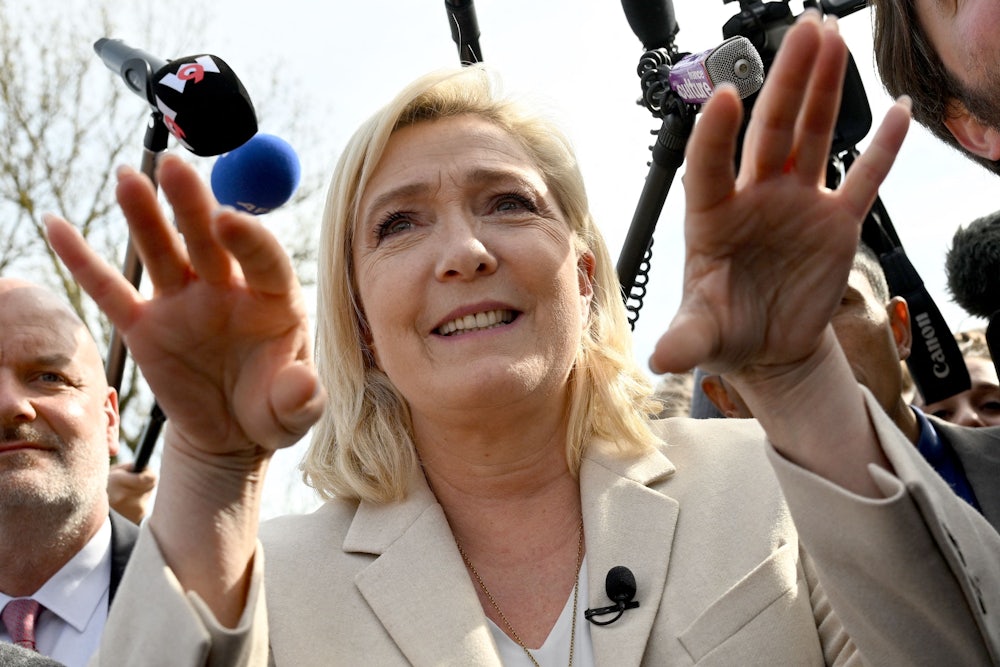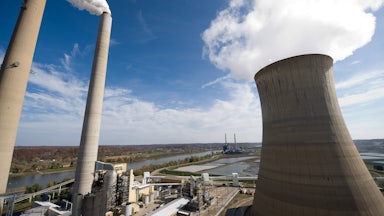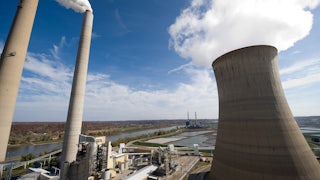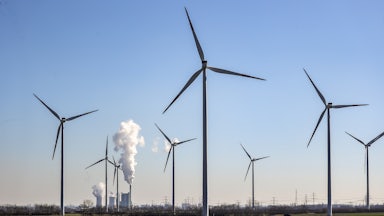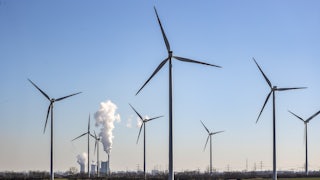Later this month, the second round of runoffs will see a rematch between French President Emmanuel Macron and Marine Le Pen, standard-bearer of the far-right National Rally. Polls that once projected Macron comfortably winning in a head-to-head race with Le Pen have narrowed in recent weeks, leading many to contemplate what until recently seemed unthinkable. At a time when the climate crisis has never been more urgent, a far-right nativist pledging to dismantle wind turbines—who’s claimed migrants “do not care about the environment” because they “have no homeland”—could soon take the reins of Europe’s second-largest economy.
While policies for reducing emissions amid the climate crisis appeared in this year’s campaign manifestos, the main focus was on cost of living and the war in Ukraine. “If we had been talking two years or even six months ago, I would have told you that the far right was very ready to engage in a debate about climate and economy,” says Pierre Charbonnier, a philosopher and research fellow at the Center for European Studies and Comparative Politics at Sciences Po Paris. “But they didn’t have to because the front line was elsewhere, on the purchasing power of the middle class. Clearly this is related to fuel prices, but the climate dimension of this was completely skipped.”
Rising concerns about the climate helped revive the fortunes of several Western European Green Parties during the European Parliament elections in 2019. But in the first round of French elections on April 10, much of the French climate vote and leftist vote in general went to democratic socialist Jean-Luc Mélenchon, founder of La France Insoumise; climate-conscious voters were drawn both to his ambitious climate program and the prospect of keeping Le Pen out of the second round. Green Party candidate Yannick Jadot’s refusal to join other center-left forces in consolidating behind Mélenchon angered some voters worried about vote-splitting: With over 7.7 million votes in total, Mélenchon came within 500,000 votes of besting Le Pen. Jadot got 1.6 million.
Several other factors weighed in Le Pen’s favor, though. Since her first run in 2017, she has sought to rebrand the party (once known as the National Front) away from her father’s Holocaust denial and open racism. This time, she had help. With a boost from France’s corporate-owned media, polemicist Éric Zemmour ran to Le Pen’s right on plans to ban non-French names and openly opined about such things as “great replacement” theory, the conspiracy theory (popular among white supremacists in the United States as well) that migration will upend white European dominance. With Zemmour to her right, Le Pen could paint herself as comparatively respectable.
Le Pen’s climate platform combines environmentalism, nostalgia, and xenophobia in a way that might be unfamiliar to a U.S. audience but in Europe carries strong overtones of ecofascism. Unlike right-wing politicians in the U.S., Le Pen doesn’t plan to withdraw from the Paris Agreement. She supports lowering emissions, at least nominally. Drawing inspiration from her adviser, French essayist and member of the European Parliament Hervé Juvin, Le Pen and other members of the National Rally, or R.N., have articulated a blood and soil–style “localism” that praises borders as a means of protecting France’s pristine nature against the “invasive species” of migrants, asserting that “Europe is the land of Europeans.” Some have speculated that Juvin could even enter the Cabinet if Le Pen wins. Like her, Juvin appears to have some admiration for Russia’s government. He was one of three R.N. members of the European Parliament to be sanctioned recently for participating in an unofficial election-monitoring trip to Russia last September.
This round, Le Pen pledged to block renewable energy proactively and cast wind turbines, in particular, as a blight upon the beauty of the French countryside. Her “Marie Curie” energy plan—named for the famed Polish-French physicist—would see nuclear power provide 81 percent of France’s power by 2050, including nuclear power plants and small modular nuclear reactors. Hydropower would account for 8 percent, and hydrogen, for both industrial and residential use, would be 9 percent of the energy mix. Wind is nowhere to be found, while solar would account for 2 percent and bioenergy for 1 percent.
/ In honor of Earth Day, Apocalypse Soon content is free to registered users until April 29. Start reading now.
This isn’t so far from business as usual—France now gets roughly 70 percent of its power from nuclear—or from Macron’s program, which also embraces nuclear in addition to renewables. (Mélenchon and Jadot both advocated a transition away from nuclear on the campaign trail.) But even advocates for nuclear power have said that Le Pen’s plans to rapidly expand France’s fleet of nuclear power plants is unrealistic. Bernard Doroszczuk, head of the country’s nuclear regulator, told Le Monde recently that the need to retire existing plants and the cost of new ones make it unlikely that nuclear will meet more than half of France’s electricity demand by 2050. Rising electricity prices and the ballooning cost of the country’s nuclear and hydropower programs have led the current government to consider fully renationalizing the power company EDF, which is already 84 percent owned by the French government.
During her campaign, Le Pen focused on the cost-of-living crisis in France as an appeal to rural and working-class voters, some of whom have already elected local National Rally governments. The Gilets Jaunes, or Yellow Vests, uprisings of 2018—when the country erupted over Macron’s proposal to raise the fuel tax to fill a gap left by his tax breaks for the wealthy—loom large as well. Le Pen’s campaign continually emphasized her pledge to reduce the value-added tax on consumer goods—including petrol—from 20 percent down to 5.5 percent; a poll from the Financial Times found that voters who rely on cars were more likely to support her now than in 2017. “This is an indirect way to support Putin’s war in Ukraine, by helping people buy fossil fuels” from Russia, Charbonnier says.
Despite the obvious dangers of a Le Pen presidency, it may be hard to convince climate-conscious voters to support Macron in the runoff. “There are two Macrons,” Nicolas Haeringer, associate director of Movement Partnerships for 350.org, told me over the phone. Macron has broadcast himself internationally as a climate leader, fulfilling the promises of the Paris Agreement. During the Trump administration, he led a global P.R. blitz to “Make the Planet Green Again,” inviting climate scientists to do research in France.
Domestically his record is less inspiring. Not long after he took office, Macron’s high-profile environment minister, Nicolas Hulot, resigned on live radio out of frustration, claiming that the climate crisis was “always relegated to the bottom of the list of priorities.” Macron went on to gut the suggestions of the Citizens Climate Convention he convened prior to the pandemic. “He basically did a U-turn while trying to pose as a climate champion in global spaces,” Haeringer says. “There is a distortion between his visibility globally and the reality in France.”
While often framed in English-language media as a stalwart of European liberalism, Macron in recent years has been preoccupied with appealing to right-leaning voters as a “law and order” politician, backing draconian anti-crime measures and shifting French politics even further right. On television last year, Macron’s hardline interior minister, Gérald Darmanin, accused Le Pen of being too “soft” on Islamism and migration—a remarkable criticism for an ostensibly liberal politician to lob at any member of the infamously anti-immigrant National Rally. (Le Pen herself looked stunned.)
Entering the second round, the tenor of French liberal punditry in the last week may now sound familiar to veterans of the U.S. Democratic primaries in 2016 and 2020: Will the idealists who backed left-wing populism grit their teeth and vote for a centrist (Macron)? Or will they defect to the far right out of frustration with the establishment? They might also, talking heads argue, take a middle route: Sit out the most important election of their lives and hand the country over to fascists.
Haeringer framed the challenge of avoiding a Le Pen presidency a bit differently. Without Mélenchon, he says, the 24 percent of voters who have said they’re now open to voting for Le Pen may well have voted for her in the first round. “We need to shift these 24 percent from active supporters of Le Pen to staying home,” he says, adding that it’d be hard to convince young voters, especially, that Macron is any better than Le Pen on climate. “That’s the work in the next two weeks: to say, ‘Yes, Macron is a catastrophe, but fighting Le Pen will be much worse.’”
The hope now for French climate activists and leftists alike is that parliamentary elections in June can offer a counterweight to whoever takes the presidency later this month, and push the country in a more progressive direction. Depriving either Macron or Le Pen of a parliamentary majority would be an enormous, virtually unprecedented lift, in no small part because of long-running divisions on the French left. Those have been inflamed by what many in Mélenchon’s camp see as disastrous decisions by the Greens and Communist parties to run their own candidates rather than consolidating support behind him.
But Haeringer and Charbonnier both see some cause for hope. Paradoxically, Charbonnier says, the election was helpful in cohering climate-concerned voters with the rest of the left, and—to a certain extent—in cohering the left itself. “It looks like we have a tripartition: the center, far right, and the left, and the left includes the green movement now. The question is how this red-green movement comes to a majority, and we are still a long way off from that.”
Haeringer saw a silver lining, as well, in the quality of the coalition that united behind Mélenchon. His electoral coalition mirrored that of Bernie Sanders in the U.S. and, together with the Green Party, captured 40 percent of voters under 35. In a change from past years, Mélenchon made explicit appeals against racism, Islamophobia, and police violence and won broad support in both diverse, working-class suburbs and urban neighborhoods and French colonies, including Guadalupe and Martinique, which are already being ravaged by rising temperatures. “This is where the left in France can become genuinely intersectional—in the place where Mélenchon came in first,” Haeringer told me. “You can start to build something that would be a new left led by people of color, by women, and by people from the colonies who have been completely ignored and invisibilized.”
If Le Pen were to win, Charbonnier says it’s unlikely that reducing emissions would be top of mind for many. “They’d be more afraid of the unleashing of street gangs, of police brutality and the collapse of the rule of law,” he told me. “To be frank, I think environmental and climate issues would be the least of our concerns.”
